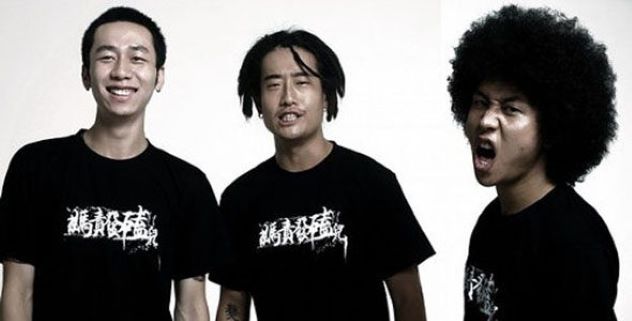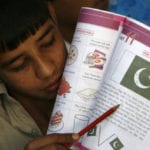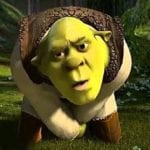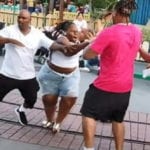 History
History  History
History  Health
Health 10 Everyday Activities That Secretly Alter Consciousness
 History
History Top 10 Historical Disasters Caused by Someone Calling in Sick
 Animals
Animals 10 New Shark Secrets That Recently Dropped
 Movies and TV
Movies and TV 10 Forgotten Realities of Early Live Television Broadcasts
 Technology
Technology 10 Stopgap Technologies That Became Industry Standards
 Weird Stuff
Weird Stuff 10 Wild Facts About Taxidermy That You Probably Didn’t Know
 Travel
Travel 10 Beautiful Travel Destinations (That Will Kill You)
 Miscellaneous
Miscellaneous 10 Modern Marriage Rituals Born from Corporate Branding
 Weird Stuff
Weird Stuff Ten Bizarre Visions of 2026 from Fiction
 History
History 10 “Modern” Problems with Surprising Historical Analogs
 Health
Health 10 Everyday Activities That Secretly Alter Consciousness
 History
History Top 10 Historical Disasters Caused by Someone Calling in Sick
Who's Behind Listverse?

Jamie Frater
Head Editor
Jamie founded Listverse due to an insatiable desire to share fascinating, obscure, and bizarre facts. He has been a guest speaker on numerous national radio and television stations and is a five time published author.
More About Us Animals
Animals 10 New Shark Secrets That Recently Dropped
 Movies and TV
Movies and TV 10 Forgotten Realities of Early Live Television Broadcasts
 Technology
Technology 10 Stopgap Technologies That Became Industry Standards
 Weird Stuff
Weird Stuff 10 Wild Facts About Taxidermy That You Probably Didn’t Know
 Travel
Travel 10 Beautiful Travel Destinations (That Will Kill You)
 Miscellaneous
Miscellaneous 10 Modern Marriage Rituals Born from Corporate Branding
 Weird Stuff
Weird Stuff Ten Bizarre Visions of 2026 from Fiction
10 Pop Songs Banned by Governments
Of their own accord, sometimes because they have been pressured by government officials or private parties, entertainment media have banned the playing of particular pop songs. Whether at the federal, state, or local level, direct government censorship of such music occurs less often.
However, due to political and other motives, government bans have taken place in China, South Korea, Pakistan, the Congo, South Africa, and the United States. The 10 pop songs on this list were among the victims of such censorship.
Related: 10 Times Musicians Were Banned From Playing In Certain Countries
10 “Fragile”
Although Malaysian rapper Namewee denies bashing China or the Chinese people or supporting Taiwan’s and Hong Kong’s independence, China banished the video featuring his hit song “Fragile” from the country. Officials insist that the artist’s tune is insulting to the nation and its citizens.
Ostensibly, the song’s Mandarin lyrics, sung by Austrian-Chinese vocalist Kimberly Chen, are part of an enchanting romantic ballad about a lover with a heart so fragile it breaks. But, according to an NBC News report, its symbols, idioms, and metaphors are disparaging, blasting “China’s volunteer army of angry digital warriors.”
Known as little pinks, these self-appointed censors form “a core element in China’s cyber nationalism, and…are highly sensitive to any criticism of the country’s leader Xi Jinping.” Those offended by the ballad point to the video’s saturation “with pink objects, decorations and costumes [and to its] dancing panda and stuffed toys in the shape of bats,” which are seen as “tweaking Chinese sensitivities over the origin of the Covid-19 coronavirus.”
Despite the ban and the controversy concerning the hit, “Fragile” has been viewed by millions throughout Hong Kong, Taiwan, Malaysia, and Singapore.[1]
9 “Beijing Evening News”

China has also banned “Beijing Evening News.” According to Jonathan Kaiman, the song by the underground hip hop group In3 is seen as representing a blistering condemnation of “the capital’s injustice and inequality.” The popular piece contrasts the plight of the poor and disadvantaged with the luxurious lives of the wealthy privileged, the former of whom “sleep in underpasses,” while the latter enjoy fine dining at banquets paid for with “public funds.”
The hit also points out the high price of health insurance, which many of the sick cannot afford. Being banned in China doesn’t seem to have hurt the band too much, though. Members pointed out that “Beijing Evening News” topped the charts.[2]
8 “Cherry Bomb”
CT 127’s hip hop hit “Cherry Bomb” has been decried by South Korean government officials who banned it as being violent and for encouraging “bad behavior among youth.” But, aside from the “Bomb” in the song’s title, the video version of the tune shows only a group of young men, their clothing changing instantaneously multiple times, as they sing and dance in settings variously resembling a parking garage, a rooftop, a junkyard, a recording studio, an art gallery, and a city street. The only “violent” moment of the performance occurs when a singer seems to punch a pane of glass, causing it to break.
The lyrics are equally innocuous, if somewhat repetitive, mixing Korean with English, a portion of which repeats: “Quickly damage (Korean characters),” followed by “Cherry Bomb yum” (in English). The refrain, also repetitive, is much like a chant: “I’m the biggest hit, I’m the biggest hit on this stage.” In the song’s verses, the group sings about the motorcycles they ride, but from the sound of things, they’re certainly not members of an outlaw motorcycle club: “All we do is party.” Midway through the song, a pre-chorus instructs listeners, “If you’re happy and you know it/ Clap your hands yo (in this beat).” Okay, moving on…
The only illusion to anything that could be construed (with effort) as violent are references to “Cherry Bomb,” which seems to allude to a beverage since it’s sipped from a “cup,” and “a gunshot,” which is ambiguous, as it might refer to anger and violence or could simply allude to the speed at which the youth would take his leave: “Who cares about a hater, hater talk, talk/ I hear what you sayin’ but so what?/ Won’t say it to my face, so I’m off, like a gunshot.”
If anything, the well-groomed appearance of the young men in their stylish clothes and imitative gangsta-style bravado suggest parody more than criminality. Apparently, even a parody of violence and bad behavior is too much for South Korean officials.[3]
7 “Letter to Ya Tshitshi”
Socrates likened himself to a gadfly; Bob Elvis, a musician operating out of his studio in downtown Kinshasa, the capital of the Democratic Republic of Congo, compares himself to a mosquito. “I may be small,” he explains, “but I can annoy you all night long by singing, biting, and not leaving you alone.”
His rap song “Letter to Tshitshi” certainly annoyed his country’s president, Félix Tshisekedi, for which reason, it appears, the nation’s Censorship Commission banned it from play days after its release. The song advises the president’s late father, Étienne Tshisekedi, of the nation’s state of affairs under his son’s tenure. The lyrics describe political corruption, electoral fraud, impure water supplies, crime, and civil unrest. As a result, not only has “Letter to Ya Tshitshi” been banned but an additional half-dozen of the rapper’s tunes were also banned. Should a radio station defy the ban, it could incur the government’s wrath in the form of lost licenses.
According to an Economist article, “The legal authority to ban the songs comes from a decree issued by a crooked dictator, Mobutu Sese Seko, 54 years ago.” Even though the song’s lyrics target his son, Félix Tshisekedi would not have agreed to the ban, the article notes: “The current president’s father, were he still alive, would be appalled.” [4]
6 “It’s Wrong (Apartheid)”
Musicians from around the world took a stand against South Africa’s apartheid, fulfilling an important part of the protest by serving as “whistleblowers and opponents of the oppressive white government,” notes Sabelo Mkhabela. One of the many such performers was Stevie Wonder, whose “It’s Wrong (Apartheid)” makes the point, as its title indicates, that apartheid is clearly, categorically, and unequivocally wrong.
Poetic justice further brought to light the hypocrisy of the government’s ban on Wonder and other musicians whose songs denounced apartheid. After he was punished by a ban on his music for having dedicated his Oscar to Nelson Mandela, the ban on “We Are the World,” the earnings from which would profit victims of the 1983–1985 African famine, had to be rescinded. The ban was lifted on the song, but it otherwise remained in place on Wonder![5]
5 “El Chuchumbé”
As Music Around the World: A Global Encyclopedia notes, the first written records of Mexican folk music, which repose in the Ramo Inquisición, include “El Chuchumbé,” which has the distinction of having been “the first Mexican song to be banned.” The ban resulted from the folk song’s depiction of “soldiers and friars fighting to seduce women.” The song itself finds fault not with the lusty soldiers and friars but with the Veracruz officials who banned “El Chuchumbé” for its “lascivious sones (sounds)and obscene coplas (verses).” Whether one performed the song or observed a performance of it, the penalty was the same for defying the ban: ex-communication, which brought a one-way ticket to hell.
The song’s lyrics are rather bawdy. As Elena Deanda-Camacho, Associate Professor of Spanish at Washington College, explains, “El Chuchumbé,” which usually refers to the navel, alludes instead to the penis in the context of this song. With this meaning in mind, the prurient nature of the opening stanza is clear. In English, it reads: “In the corner he stands / a friar from la Merced / with the lifted habit /showing his chuchumbé.”
Additional lyrics further indicate, without a doubt, the meaning of the word as it is used in the song: “Whether you like it or not/ the ‘chuchumbé’ is going to get you / and if it does not fill you, I will fill you up / with what is dangling from my chuchumbé.” Listeners obviously understood the meaning of the song. As it played, dancers interpreted its lyrics “with gestures [and] shakings,” their conduct constituting “a bad example to those who watched [the dancers]…mixing caresses and…touching belly with belly.”
Church and state were both scandalized by the song’s decadence and its immoral effects, and “Chuchumbé” was banned by the Spanish Inquisition, the government enforcing its prohibition by arresting offenders and turning them over to the Church for investigation and punishment.[6]
4 “I Don’t Want to Get Well (I’m in Love with a Beautiful Nurse)”
The United States War Department banned “I Don’t Want to Get Well (I’m in Love with a Beautiful Nurse),” apparently because the brass feared its lyrics might persuade soldiers to follow the example of their fictional counterpart.
The front of the record sleeve shows a beautiful Red Cross nurse standing by the side of a recovering soldier’s bed, holding his hand as he looks up at her. Outside the window, as an ambulance passes, one soldier shoots an enemy combatant, suggesting another of the hospital’s beds will be needed shortly.
The song’s lyrics are attributed to a friend of the soldier, who shares the contents of a recent letter he has received from the wounded soldier in answer to one of the sender’s own earlier correspondences. His pal, we learn, “was wounded in the trenches somewhere in France.” Having been asked, in his friend’s earlier letter, whether he was on the mend, the soldier responds with words that echo the song’s title, adding that “the cutest girl” feeds him with a spoon and takes his pulse. And when on the verge of recovery, he relapses. and she “begs [him] not to leave her,” meaning, possibly, she hopes he will not die.[7]
3 “Ohio”
When the Vietnam War protest on Ohio’s Kent State University resulted in the deaths of four protesters who were shot by National Guard soldiers on May 4, 1970, riots raged across the country. Neil Young responded with his classic hit song “Ohio,” which contains the lyrics “four dead in Ohio,” an obvious reference to the protesters who lost their lives on the campus.
Conservative radio stations refused to air the song protesting the deaths of the protesters. James Rhodes, Ohio’s governor, ordered the state’s stations to ban broadcasts of the Crosby, Stills, Nash & Young single. Despite the ban, however, independent AM stations joined FM stations in playing the banned song, and the “radical tune” landed in fourteenth place on the charts.
Later, “Ohio” was released, with “Find the Cost of Freedom” on the flip side, in a sleeve that listed the U.S. Constitution’s Bill of Rights and their guarantee of such freedoms as the right to assemble and the right to engage in free speech.[8]
2 “Wake Up, Little Susie”
Somehow, even the Everly Brothers found a way to make an innocent date seem risqué. The lyrics have a teenage boy awakening his date, Susie. Although they’ve fallen asleep in a movie theater, the boy appears concerned that the lateness of the hour—it’s four o’clock in the morning—will make Susie’s parents think they have been up to what their friends would call “Ooh-la-la.” They found the movie’s plot so boring that they fell asleep, and now, the boy fears their “reputation is shot.”
The song is “about how innocent acts could be misconstrued as deviant behavior in the stiff 1950s,” a Decades website article observes. A conclusion that seems borne out by the fact that the song was banned at the time by the city of Boston.[9]
1 The Beatles’ Entire Oeuvre
The Beatles were once banned in the Philippines. Neither their music could be played, nor their records sold. Unlike bans in other countries, this one wasn’t imposed because of politics, concerns about violence or sexual improprieties, institutionalized racial segregation, social injustice, military officers’ worries about the effects that a song might have on soldiers, or even troops’ shootings of protesting citizens. The president of the Philippines took such action because President Ferdinand Marcos believed that the mopheads had “snubbed” his lady love, First Lady Imelda Marcos.
The band’s offense? A prior engagement had precluded their acceptance of her invitation for them to join her for lunch. Government-owned newspapers throughout the islands criticized the allegedly rude musicians’ boorish behavior. Two concerts during the same day, before 100,000 Filipino fans, led to crowds’ shouts and threats as the famous foursome took off from Manila’s airport. Although the ban was lifted not long after it went into effect, the Beatles’ music never stopped being played in Filipino bars.[10]



![10 Episodes That Were Banned From Television [Videos—Seizure Warning] 10 Episodes That Were Banned From Television [Videos—Seizure Warning]](https://listverse.com/wp-content/uploads/2019/10/image-150x150.jpg)




